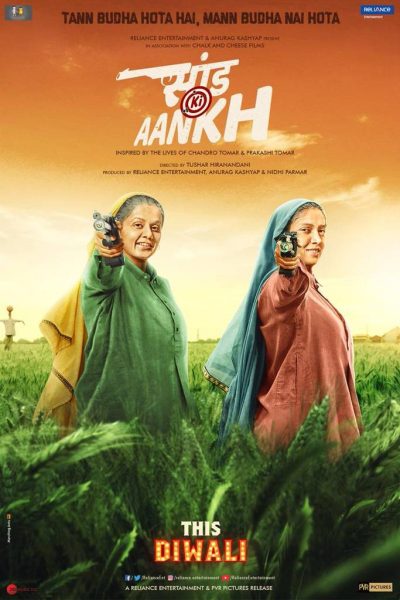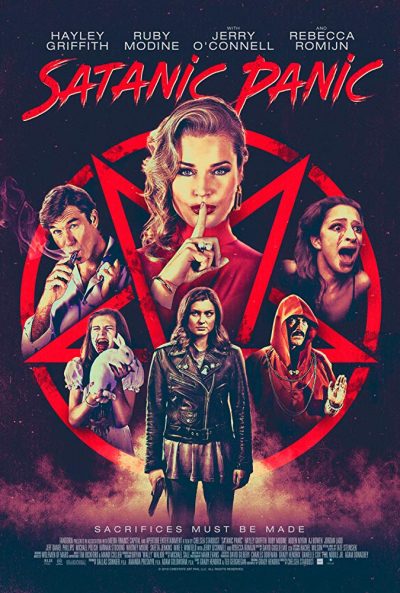★★½
“Army dreamers.”
 This suffers from being almost exactly the same story as the previous feature we reviewed about women Kurdish fighters going up against ISIS, Les Filles Du Soleil. Both focus on a woman who is kidnapped by ISIS after they sweep through her town, and gets sold into slavery by her captors. She escapes, and joins of the all-female units who are battling the jihadist occupation. Bur there is a family member – in Filles, the heroine’s son; here, her younger brother – who is still with ISIS and has become a child soldier for them. Even if you haven’t seen the earlier film, you’ll not be surprised to hear this plays a key role in the film’s climax. The similarities are so startling, I kept expecting to hear this was a remake. It just appears to be a carbon-copy.
This suffers from being almost exactly the same story as the previous feature we reviewed about women Kurdish fighters going up against ISIS, Les Filles Du Soleil. Both focus on a woman who is kidnapped by ISIS after they sweep through her town, and gets sold into slavery by her captors. She escapes, and joins of the all-female units who are battling the jihadist occupation. Bur there is a family member – in Filles, the heroine’s son; here, her younger brother – who is still with ISIS and has become a child soldier for them. Even if you haven’t seen the earlier film, you’ll not be surprised to hear this plays a key role in the film’s climax. The similarities are so startling, I kept expecting to hear this was a remake. It just appears to be a carbon-copy.
There are some differences, the most notable feature being the multinational nature of the women’s group here. As well as local Yezidi Zara (Gwyn), there are two young Frenchwomen, Kenza (Garrel) and Yaël (Jordana), an American sniper (Nanna Blondell, who was in Black Widow), etc. The ISIS are similar: the chief “bad guy” is English, with a strong Northern accent – though I’ve been unable to take English jihadists seriously, ever since watching Four Lions. It’s no easy task for the women’s commander (Casar) to mesh all these different upbringings, experiences and personalities into a cohesive unit.
And extending the similarity to Filles, the film has the same main weakness, and ends up spreading itself too thinly across the multiple stories it wants to tell. None of them manage to acquire the necessary depth, and most of which are more or less obvious. Not helping, the film has an unfortunate tendency to sink into drippy feminism. The montage sequence of the women training, accompanied by a pseudo-empowering “I am woman, hear me roar”-type song, marked a particular low point. More successful in general is the technically impressive action. The film’s best sequence depicts a battle between the women and a platoon of ISIS troops who are chasing a group of fleeing refugees, which includes Zara. It’s beautifully shot and well-staged, with a genuine sense of tension.
Yet, there are other, almost embarrassingly naive moments, such as the women entering a town their side has just bombed, and standing in the middle of the street for a chat, without checking the area has been cleared. I’m not a soldier, but even I know that’s… not wise. Such gaffes aside, it’s mainly the hackneyed and trite storyline that stops this from achieving any real degree of success. There is certainly a fascinating story to be told in the Kurdish women’s battalions and their part in the war against ISIS. But that’s now two efforts which appear to have barely scratched the surface, or gone beyond the obvious. Particularly here, they seem more interested in political, religious and gender-based point-scoring than telling a good story.
Dir: Caroline Fourest
Star: Dilan Gwyn, Amira Casar, Camélia Jordana, Esther Garrel





 A promising idea has its concept snuffed out by shaky execution and even worse writing. Sam (Rogers) is a former solder and now single mother. When her child falls sick, Sam heads for the chemist’s for medicine. She never gets there, being abducted in a van and rendered unconscious. She wakes in a large warehouse-like facility in the middle of nowhere, which turns out to be a military production facility. She’s not the only woman there, and finds that an invisible adversary, using advanced tech to cloak his presence, is taking advantage of the weekend to turn the place into a stalker’s amusement park. However, Sam’s background perhaps gives her a very particular set of skills, unavailable to the other victims.
A promising idea has its concept snuffed out by shaky execution and even worse writing. Sam (Rogers) is a former solder and now single mother. When her child falls sick, Sam heads for the chemist’s for medicine. She never gets there, being abducted in a van and rendered unconscious. She wakes in a large warehouse-like facility in the middle of nowhere, which turns out to be a military production facility. She’s not the only woman there, and finds that an invisible adversary, using advanced tech to cloak his presence, is taking advantage of the weekend to turn the place into a stalker’s amusement park. However, Sam’s background perhaps gives her a very particular set of skills, unavailable to the other victims. It’s interesting to compare this with the recently reviewed
It’s interesting to compare this with the recently reviewed  Four women run a charitable agency in Texas, helping single mothers track down and obtain child support payments from deadbeat dads. However, they don’t limit themselves to the simple serving of legal papers. The women adopt a more… hands-on approach, shall we say, first luring their targets in with the promise of sex, then threatening them at gunpoint, to make sure they pay up. For obvious reasons, the cops soon take interest in this string of unusual armed robberies. Meanwhile, the city’s white mayor, is dealing with a domestic crisis of her own, thanks to her daughter having had a child by (gasp!) a black man.
Four women run a charitable agency in Texas, helping single mothers track down and obtain child support payments from deadbeat dads. However, they don’t limit themselves to the simple serving of legal papers. The women adopt a more… hands-on approach, shall we say, first luring their targets in with the promise of sex, then threatening them at gunpoint, to make sure they pay up. For obvious reasons, the cops soon take interest in this string of unusual armed robberies. Meanwhile, the city’s white mayor, is dealing with a domestic crisis of her own, thanks to her daughter having had a child by (gasp!) a black man. Even if the film doesn’t quite live up to the title and poster, it turned out to be better than I expected… from the title and poster, to be honest. It has been my experience that, the more lurid the advertising, the more disappointed I’m likely to be. Films like this often don’t just fail to deliver on what they promise, they also struggle with basic aspects of film-making, like plot and characterization, providing a double-whammy of failure. While the former is true here (no-one, at any point, is
Even if the film doesn’t quite live up to the title and poster, it turned out to be better than I expected… from the title and poster, to be honest. It has been my experience that, the more lurid the advertising, the more disappointed I’m likely to be. Films like this often don’t just fail to deliver on what they promise, they also struggle with basic aspects of film-making, like plot and characterization, providing a double-whammy of failure. While the former is true here (no-one, at any point, is  After a boat-wreck, Jennifer Remming (Clemons) washes ashore on a deserted tropical island, and has to make do with what she can find and forage. While there are no other people on the island, she’s not alone. It becomes increasingly clear that a “something” is predating for food at night there. She eventually finds out what it is: a large, amphibious and very hungry creature, walking on two legs, and capable of dragging its prey back into its lair beneath the water. Needless to say, she’s delighted when two other survivors wash up in a lifeboat: her boyfriend Lucas (Cohen) and friend Mia (Mangan-Lawrence). But convincing them of the threat, and the need to get off the island immediately, is a little tricky, because it turns out Jennifer has a little history of making things up. However, “being eaten” turns out to be fairly convincing proof, as evidence goes…
After a boat-wreck, Jennifer Remming (Clemons) washes ashore on a deserted tropical island, and has to make do with what she can find and forage. While there are no other people on the island, she’s not alone. It becomes increasingly clear that a “something” is predating for food at night there. She eventually finds out what it is: a large, amphibious and very hungry creature, walking on two legs, and capable of dragging its prey back into its lair beneath the water. Needless to say, she’s delighted when two other survivors wash up in a lifeboat: her boyfriend Lucas (Cohen) and friend Mia (Mangan-Lawrence). But convincing them of the threat, and the need to get off the island immediately, is a little tricky, because it turns out Jennifer has a little history of making things up. However, “being eaten” turns out to be fairly convincing proof, as evidence goes… Revenge, as the saying goes, is a dish best served cold. Or, from another saying, hell hath no fury like a woman scorned. Illustrating both are the story told here. Jasmine Albertson had already gone through the lows and highs of life, before meeting and getting married to Stu. But when Stu’s business partner John Mickelson makes him take the fall for John’s embezzlement, leading to Stu’s suicide, Jasmine vanishes off the grid in Los Angeles. She moves to New York and sets her sights on a long-term plan to make John pay. And not financially: as she tells her gay best friend Tory, “I want him to know he fucked with the wrong people when he fucked over Stu and then me. I want him to suffer. And then I want to send him to hell.”
Revenge, as the saying goes, is a dish best served cold. Or, from another saying, hell hath no fury like a woman scorned. Illustrating both are the story told here. Jasmine Albertson had already gone through the lows and highs of life, before meeting and getting married to Stu. But when Stu’s business partner John Mickelson makes him take the fall for John’s embezzlement, leading to Stu’s suicide, Jasmine vanishes off the grid in Los Angeles. She moves to New York and sets her sights on a long-term plan to make John pay. And not financially: as she tells her gay best friend Tory, “I want him to know he fucked with the wrong people when he fucked over Stu and then me. I want him to suffer. And then I want to send him to hell.” It’s the first day as a pizza delivery gal for Samantha Craft (Griffith), and things aren’t going well, with no tips being received. When given the chance of a delivery to a rich neighbourhood, she pounces – only to find herself getting stiffed again. This time, she sneaks in to demand her gratuity, which drops her in the middle of a satanic ceremony overseen by coven head, Danica Ross (Romijn). They’re attempting to summon Baphonet, but have hit a snag. Their intended vessel, Danica’s daughter Judy (Modine), no longer qualifies as a virgin, so Sam’s presence is highly convenient. For Sam? Not so much. Though perhaps to her benefit, there’s a bit of a power struggle in the coven, with Gypsy (Myrin) fed up of playing the second satanic banana to Danica.
It’s the first day as a pizza delivery gal for Samantha Craft (Griffith), and things aren’t going well, with no tips being received. When given the chance of a delivery to a rich neighbourhood, she pounces – only to find herself getting stiffed again. This time, she sneaks in to demand her gratuity, which drops her in the middle of a satanic ceremony overseen by coven head, Danica Ross (Romijn). They’re attempting to summon Baphonet, but have hit a snag. Their intended vessel, Danica’s daughter Judy (Modine), no longer qualifies as a virgin, so Sam’s presence is highly convenient. For Sam? Not so much. Though perhaps to her benefit, there’s a bit of a power struggle in the coven, with Gypsy (Myrin) fed up of playing the second satanic banana to Danica. Within about two minutes of starting this, I realized I had made a terrible mistake, and was watching something barely reaching the amateur level of film production. Still, I soldiered on – albeit for some loose definition of “soldiered” – until the bitter end, mostly so I could issue an informed warning about this to any prospective viewers. Maxine (Mitchell) is rather upset when she discovers her boyfriend, music video producer Lance (Watts) has been cheating on her with Lana (Bryant). Mind you, she’s clearly a bit unhinged already: for example, telling him she’s pregnant when she isn’t. So it’s not much of a surprise when her reaction to his two-timing is to kidnap Lance, tie him up in her basement and submit him to various indignities, along with seeking revenge on Lana. Which, apparently, includes sleeping with her father (Walker).
Within about two minutes of starting this, I realized I had made a terrible mistake, and was watching something barely reaching the amateur level of film production. Still, I soldiered on – albeit for some loose definition of “soldiered” – until the bitter end, mostly so I could issue an informed warning about this to any prospective viewers. Maxine (Mitchell) is rather upset when she discovers her boyfriend, music video producer Lance (Watts) has been cheating on her with Lana (Bryant). Mind you, she’s clearly a bit unhinged already: for example, telling him she’s pregnant when she isn’t. So it’s not much of a surprise when her reaction to his two-timing is to kidnap Lance, tie him up in her basement and submit him to various indignities, along with seeking revenge on Lana. Which, apparently, includes sleeping with her father (Walker). This takes place in the Indian city of Delhi, and despite the title and the poster, is really about two policewomen, almost equally. Title billing goes to Soni (Ohlyan), a young officer who is coming to terms with life after divorce from her husband, Naveen (Shukla). She is also the possessor of a fierce temper, which repeatedly gets her into trouble because she’s unable to keep her cool with suspects. Forced to play clean-up is her boss, superintendent Kalpana Ummat (Batra), who seems to see something of her younger self in Soni, as well as appreciating the junior cop’s potential. But there’s only so far she can protect Soni from the consequences of her outbursts.
This takes place in the Indian city of Delhi, and despite the title and the poster, is really about two policewomen, almost equally. Title billing goes to Soni (Ohlyan), a young officer who is coming to terms with life after divorce from her husband, Naveen (Shukla). She is also the possessor of a fierce temper, which repeatedly gets her into trouble because she’s unable to keep her cool with suspects. Forced to play clean-up is her boss, superintendent Kalpana Ummat (Batra), who seems to see something of her younger self in Soni, as well as appreciating the junior cop’s potential. But there’s only so far she can protect Soni from the consequences of her outbursts.